Cover Portrait: Gianluca Seguso by Lina Daugirdaite for ZEFYR LIFE. | Read the entire conversation below.
Gianluca Seguso is a member of the 23rd generation of the legendary Venetian Seguso Family glass makers. The Seguso Family has been dedicated to the art of Murano glass in Venice since May 3, 1397. Seguso Vetri d’Arte quickly became one of the most important glass furnaces in Murano and the centre of creative energy and technical innovation on the island during the mid twentieth century. Seguso is one of the most esteemed, historical and respected glass manufacturers on the island and in the world, and amongst the largest glass furnaces in Murano. Glass artworks and sculptures made by the Seguso furnace can be found in over a hundred museums worldwide, including MOMA in New York, the Victoria and Albert Museum in London, Corning Museum of glass in Corning, Museo del Vetro in Venice and the Chrysler Museum of Art in Norfolk. Today, Seguso is known for its high-end Venetian glass objects, lighting, furniture, accessories and custom installations. Seguso glass has been made for the Pope, Royalty and numerous luxury interiors of private residences and hotels throughout the world. Gianluca Seguso is now at the helm of the family company with his brother Pierpaolo. He lives in Murano with his wife acclaimed Chef and Events Planner Marika Contaldo Seguso and their four children Nicoló, Allegra, Jacopo and Gianmatteo.
Florian DAVID: Thank you for the time you are granting us in such a busy schedule! Reading through the two books that you kindly offered us we thought that there were great many similarities with our own perspective on life, our own life philosophy. We could also see that through the questioning that you are putting out into the world with your art. Your glass sculptures, your Seguso artworks, are already to be found throughout the world in many private residences, institutions and Museums such as the MOMA, The V&A Museum, The Chrysler Museum and so on. Do you consider yourself a Citizen of the World, Gianluca Seguso, or are you Italian First? [smile]
Gianluca SEGUSO: Welcome Florian. Thank you and thank you for the kind of question and angle that you have here. Do I feel a citizen of the world or an Italian first? It is not easy to give a straight answer because I had the luxury or opportunity to experience different cultures. I was born and raised in Venice, studied all the way through high school in Venice and then spent over five years in Milan through University, then back to Venice when it was time to work. I then lived in New York for a good ten years, and then back to Venice and I have now been living here twelve years with my wife and our four children. So when you experience different places for quite a long time you are going through cycles, you start loving new habits, then you see the difference with the old ones, then there are things that bother you and there is a time when you feel - at least I felt - a citizen without a land. There were elements and habits and cultural pillars that were very strong and fundamental in different places where I lived and with different people that I have met. I am a curious person. So I think that I am not a citizien of the world yet but on my way towards it, even though my roots are strongly attached to the Italian culture and the Italian heritage.
DAVID: I would like to explore further this curious mind of yours. How does that translate into your daily life?
'I FEEL A CONSTANT CURIOSITY. THE ANSWER 'THIS IS THE WAY THINGS ARE DONE' IS AN UNFINISHED SENTENCE FOR ME.'
SEGUSO: Well, I will try to share with you what I feel. My attention goes towards why certain things happen. That is kind of a natutal state of mind for me. This kind of curiosity triggers interest, relationships, paths towards what could be done and what should not be done. I feel a constant curiosity. The answer ‘this is the way things are done’ is an unfinished sentence for me. What is behind? In other words, and I’d like to talk in a metaphorical way: In other words, yes, the destination of something or someone is something that I am interested by, however what I really like is the journey, that is what has the deepest and strongest flavour. Which translates also in a constant attitude that I find I have had in my life since I was a kid: I was not a very good student, I did not like to study, they said that I was smart but found it a pity that I was not performing. My parents taught me that the ultimate achievement was not in reaching the goal but in giving yourself a hundred percent. I kind of have a similar approach with my children, but I think that the achievement is equally important, so long as we achieve without anxiety. So, say, a runner at the olympics: a runner runs a hundred yards or meters, and gives himself two-hundred percent while he runs, but one instant before the finish line the result should not be important. The result is the consequence of what you do it is not the objective. And that is really a very thin detachment between effort, determination, values, and the actual anxiety of the end-result. Just one second before you cut the finish line, that micro-second does not have an incidence on your performance, what counts is how you approach your results afterwards. Therefore if you got to a point where you are higher than where you expected to be, it does not matter, you can still grow. If you are lower than where you expected to be, or where they were expecting you to be, their judgement does not matter. You can always get better. So it is erasing the negative effect that any result in a competition can have, even if you are number one. That, I find that fascinating.
DAVID: Do you think that this idea of giving yourself two hundred percent in life and living up to your full potential is a value that has been passed on to you by your father? Giampaolo, your father, said in an interview ‘I am grateful because I know have made the most of all my talents and I have kept none buried’.
SEGUSO: Without any doubt. It is like in life or in nature, it is difficult to find the exact moment when things make an impact. You put a seed and after a while a flower blooms. I think this blooming process is the most impactful revolution. It is a constant evolution that really makes things different. Without any doubt my upbringing led to who I am. Being raised by my dad and my mum with my sisters and brothers, in a way where rationality and soul and philosophy were working hand in hand, there was a lot of faith, a spiritual approach. I like to call this ‘the soundtrack of our life’, a certain flavour is there even though you don’t see it, and I think that for sure part of my development comes directly from my father. I know the other side is from my mum as well, and then I think that we are a small precious container that collects elements from all the great people that we encounter in life. So it is an addition of these things, it is really a spectacular journey.
DAVID: And it is a journey really beyond your own life. As your father said there are four ways to make glass: ‘I make glass, We make glass - as a team - or WE make glass, referring to building upon the legacy of all the other extraordinary glassmakers people who preceded us, and then the fourth way: ‘Glass makes itself’. [smiles]
SEGUSO: Which is the answer when you understand the nature of life. Things happen, and without any doubt we make the difference but indeed we need to understand and feel what is beyond things. And what matters is beyond. Doing business for me is a hobby, the real job is to build a culture and leave a trace. And it is not easy, Every day is a challenge, but again, going back to that runner, once you get to the podium and you know what you have given all you have, you almost not give time to yourself to enjoy the result because it does not matter [smile]. What matters is that journey giving yourself a hundred percent. It is like ‘what’s next?’
At Seguso Vetri D’Arte in this process of building brand, a company, a legacy, in asking ourselves what our role is as a twenty-third generation of this family's legacy, we have developed a roadmap, a process within our company, and have started to share that. We have seen that the fact of understanding who we are and what we do - we call it awareness - is the number one aspect that allows us to understand in what order we must put things that are coming to us from the past, it clarifies the why we do what we do. It gives a sense of responsibility once you are aware of what what was important then and what is important now. You feel that responsibility. Yes we are the twenty-third generation, May 3rd, 1397. And we can talk for hours about how good we are and yes we are in museums and other things, but we have no merits. My brothers and I have no merit, we found the company, we are not the founders. And this is not to diminish our value or our position, it is just to picture reality, and authenticity is the key ingredient I think; especially nowadays with fast communications and social media you can grab knowledge very quickly - but as my grandmother used to say everything that you get fast you can also lose fast, so I want to make sure for my children that they can grab and absorb information fast with awareness knowing what to look for and with the ability to retain permanently only those facts that are truly important.
DAVID:The other day I heard you compare life to a roller coaster. Could you elaborate?
'I THINK THE ROLLER COASTER IS A GREAT METAPHOR, BECAUSE FIRST OF ALL ANYONE CAN RELATE TO IT,
THE ADRENALINE THAT YOU HAVE WHEN YOU GO UP AND DOWN
AND I AM SURE THAT EVERYONE HAS HAD THEIR SHARE OF FEAR AT A CERTAIN POINT IN THEIR LIVES.'
SEGUSO: I like to compare life to a roller coaster, yes life is like a roller coaster - I think someone said rafting down a river. I think the roller coaster is a great metaphor, because first of all many can relate to it, the adrenaline that you have when you go up and down and I am sure that everyone has had their share of fear at a certain point in their lives. If you imagine life as a roller coaster, you can be a kid or an adult, a father or a son, there are moments where you get terribly scared. There are moments where you feel that you are enjoying the ride and all of a sudden things change so drastically that you do not know why and you get mad, and then when you think that you have recharged yourself a little bit like a cell phone battery, it does not last, you enter a tunnel again, upside-down, sharp turn to the right, then sharp turn to the left, and those sharp turns leave on your shoulders - if you are lucky - some blue marks. So I am not saying that it is easy at all but it is absolutely doable, it is the most spectacular journey we can enjoy once we understand that if we look at this roller coaster from above, meaning we have to step back, get a drone view, and instead of focusing on yourself the angle gets wider - it is you in that cart with others, then you with others in that cart in that part of the rollercoaster - pretty steep down - and then you start seeing the entire roller coaster, with the wonderful background and horizon, the ocean, the sunset, the mountains, with snow and whatever you want. The further you zoom-out, the more you reposition your feeling of fear, the more you get to a point where you understand that there is only one thing that is really key, is making sure that your cart, your truck, your seat, is well attached to the railway. Everything else if just wonderful. Even for our children - it seems sad but its is not - they will learn the most important things in their lives when they will really experience fear, when they will reallly be at a point of thinking that they have no other options. Not because we are cruel, not because life is a terrible place, but because when you go down to the essence of things you really decode the real meaning. So it is important to prepare solid ground in order to hold the weight of these moments. My mother liked to write and share fairy tales, this is an important element to my approach. Imagine that you look at one of the old days Disney cartoons, and the old lady starts opening and reading that story - that’s our life - and each of us has the most special title of that bestseller book which is our first name: my name, Gianluca, your name Florian, my son’s name Gianmatteo, my daughter’s name, Allegra, my other sons’ names, Nicoló and Jacopo, it is our names on these books, and if we share these books with authenticity there is nothing we can fear.
DAVID: What we realize throughout the various conversations we are having with ‘world-conscious high-achiever’ personalities as we have defined them, - people who have become highly succesful in their fields and yet have remained grounded in this peculiar way of being to actually question the world around them and care deeply about that world around them - is that this way of being is always the result of a transformational process. I am quite curious to understand as far as you are concerned what led you to thinking that way about life and approaching your journey that way.
'THERE ARE CERTAIN THINGS WHICH, FOR THOSE WHO HAVE NOT EXPERIENCED SOMETHING IN THAT CATEGORY SIMPLY CAN NOT BE UNDERSTOOD'
SEGUSO: In a certain way it is this blooming revolution that I mentioned earlier. There is not one specific moment when it starts but it is a constantly unfolding process. I took some notes at times of solitude - meaning when feeling really lonely - one day maybe it will be part of my memoires! [smiles]. These are the times when I felt in these tough corners. The best way I can explain - and I do not want to be judgmental towards anyone here - it is like when you grow-up and get married and start thinking of having kids, and you spend time with friends who actually have kids and you think that you understand what it is like. The moment that I became a father is when I realized I had no clue. This is beyond being able to explain what it means. It is like going from broadcast radio before TV was invented to High-Definition in one instant. It is like trying to explain to someone something that is three-dimensional in colour using two-dimensional black-and-white cardboard, you do not have the elements to really explain it. There are certain things which, for those who have not experienced something in that category simply can not be understood. And we are in a time culturally worldwide, society, especially in this old continent in Western Europe and in the Americas where whe have not had a war for a fairly long time. I mean we have not had serious war situations with bombing for a good number of decades - which is not bad at all obviously, however that means that there are fewer and fewer grand-parents able to share what war meant. And during the latest two or three decades, there has been another kind of war that society needs to adapt to because it has bigger psychological effects: we do have winners and losers, we do have casualties and deaths, we do have heroes and survivors, but they are not visible: buildings are still standing, windows are not broken, life seems to be like in The Truman Show, everything goes on and on in the same way every day. If you look at the emotions of these people that have been through casualties, loss, success or failure, all of them are feeling [terribly] lonely. Really it shifts the paradigm on how to address what some have called ‘the worst recession in a hundred years’. If you walk along the streets, and you are entering a neighbourhood, and you start seeing dust and then broken buildings and then a kid and a lady walking with a wooden leg, or a wooden arm, your feelings naturally go towards these persons in order to help them. You have compassion for them, you can see [their injuries]. Now, the next day you walk up the same street and you start seeing the same neighborhood with dust and buildings that are not broken, and there is no damage, windows are not damaged, there are still people walking down the streets: they are not woodened but they are burrying their feelings with headphones, cell phones, that is all they do, you can see some expressions, some smiles, but really they are walking heads-down. They might be the same people with the same kinds of wounds and scars but they are not as visible. So attention, compassion, the ability to see, are key. And that is why I wanted to share something so important: once you start talking about something, once you share something as deep, once you show part of your wooden arm or broken leg, or destroyed buildings, once you share that, it is not just a moment, an opportunity to share [your story], you are opening the door to others in order to make sure that they are not feeling alone. It is very important in this moment of culture and evolution, because the more we talk about ourselves with authenticity the more we can recognize each-others and so we have no fear to open ourselves up. I would like to read one phrase that I used in the preface of our book Song of Glass which goes back to the ability to see. It is taken from Saint Exupery, ‘What is essential is invisible to the eye, it is only with the heart that one can see rightly. What is essential needs to be recognized, in order to be guarded but with delicacy, harmony and respect’.
So here is my moment of sharing, or coming out. You asked me how I started to think this way. Well, it bloomed from taking notes and putting together a snapshot of tough moments when I saw that there were no options. And if I should write a book now, probably the title would be something like ‘Why I have not been number 151’. It was back some years ago. it was in a time of deep recession and I can relate to what Elon Musk said in an interview once: Musk said that being an entrepreneur was like looking into the deep sea chewing glass (‘Guardare nell’ abisso masticando vetro’). Well, glass is close to me, but I understood that sense of terrible loneliness, with the deep blue of the abyss that attracts you and pulls you while you are doing something fairly uncomfortable like chewing glass.
Now, the reason why I was not number 151 (I like numbers, to me numbers have a role, a position and a colour). I was born January 5th, so zero, one and five. In that period here in Italy and especially in that region in the North-East of Italy, there was a tough consequence of the recession. The number of entrepreneurs that committed suicide was very high. I do not remember in which part of the country it was exactly, but I remember a newspaper headline: ‘150 entrepreneurs commited suicide in the last 12 months’. Italy is built on the shoulders of small family businesses. Italy's economy is not one giant building made of concrete and stainless steel. Italy is more like a spine made of many disks with a buffer in between, they move but they keep the body straight. So business and family and relationships are intertwined. I can clearly understand what those entrepreneurs were facing. First was the sense of not being able to solve the problem. Second the fact that they knew that they were not guilty, then the embarassment, but above all I think not being able to hold on the ship and take it to a safe harbour with all the crew and the companions in it. And if you don’t have strong, rock-solid bases, that jump is very easy. I would say, almost natural. Because you give two-hundred percent of yourself, and in this society there is a lack of indicators on the real evaluation of things. So I could understand that flavour. And so I started asking why was I not number 151. I don’t know. But I’m not. And I know that there is the way out. I used another metaphor the other day talking to you: it is like surfing on a big wave. You go fast, you enjoy it, you are cool, people are watching you and you feel the vibes once you get into the tunnel of that wave - and yet the energy, the power that are given by the wave do not depend on you: what’s key is just being able to maintain you balance and keep the eyes focused on the destination, not be distracted. So that’s how I think that my flower blossomed into this direction. And that’s where I think we can leave something meaningful after us, we can call it culture, business model, relationships, I don’t know, it is a mix of all that.
And if I look at myself Florian, what I see in front of me is a huge number of areas where I am not performing, where I am not as good as I wish I were. You are asking which kind of personality I am? I am not an easy kid [laughs] I am not easy, I am tough, I am pretty demanding, I can be pissed-off, especially if there is something that is unfair or false, but I think that I can say that I am loyal. I think, that is really key, that the results lie on details. There is a sentence I like a lot - I keep it on my WhatsApp status, that reads ‘The difference between ordinary, and extraordinary has a name, and it is yours.’ The ordinary I don’t want to see, I would not say that it leads to mediocrity but it is not that far. We are called to make the difference between extraordinary and ordinary and that happens just by paying attention to the details and it does not make me better becaue I am saying that, and it does not mean that I am free of failings. Actually I have probably more failings than the people who are alongside me and I am the one who talks! [Laughs]. We need to keep repeating ‘don’t let the details go away’. So I am curious, I am temperamental, I get pissed-off, I am demanding and passionate. I also don’t like to mistake effect with cause, sometimes people get to a point where they mistake the effect for the cause, and that distracts, that creates a place where we are not tackling the real problem.
DAVID: Do you have an example?
SEGUSO: Let me answer this way. If we focus on the effect and that is on something that was wrong or not good, we are focusing on that flavour of the problem and we are feeding our mind with what not to do, what was wrong, why it happened, and we lose time and energy focusing on the so-called problem - the effect. Instead of stepping backwards and looking at the reason which caused that problem at the first place…It is really a small change of angle - if you are looking at the cause that generated that effect, your attitude is no longer criticising the result, focusing on the mistake, focusing on the error; you are now focusing on how to find a solution. The issue for instance is not global warming, the issue is the lack of an environmental culture, that is the issue. If we reverse cause with effect we waste a lot of work and a lot of time that could be used to everyone’s best advantage finding the solution. That is what I mean by reversing cause with effect.
DAVID: You have shared some very personal emotions and life moments. We can only guess what you have been through in your life, coming close to this edge. There is a lot of pressure that has built-up in our society, yes. There is a war, yes, that some people prefer not to acknowledge. I would like to come back to that pressure you mentioned. And that feeling of inadequacy, of not being good enough, that pressure. Your wife shared with us a nice anecdote. Nicolo one of your sons had made a design of a sculpture and once that sculpture was actually completed and he had to sign it he signed with his first name. When you asked him to write his last name he said he did not feel he was good enough yet to sign ‘Seguso’. Did that ignite in you any questions about the kind of responsibility that is being placed on your shoulders generation after generation, for twenty four generations, honouring the legacy of people who have dedicated their lives to their craft, who maybe were harbouring other dreams inside themselves, for themselves, and pursed a journey that, for some, might not have been theirs otherwise?
SEGUSO: It is interesting this anecdote you are mentioning with Nicoló. He is ten now, so he may have been seven, not even maybe. We have to be careful as parents, but not fearful. Every children is different and there are different kinds of sensibilities and sensibility is one of those things that up until the time when you are strong and built are perceived as weaknesses. In reality fragility contains in it some very strong values and energy that will blossom later on. I was very surprised when he did not sign Nicoló Seguso. In a broken Italian because he inverted the words he said ‘I am not good enough’. I think that came through the fact that he saw the family lineage with first names and last names, and when we did the family tree we always just wrote our names without the last name. The way he said it meant ‘I am not ready yet, I am young, I am not there’. So yes I think there was pressure but also some humbleness, some respect.
As far as I am concerned, I don’t think that I live with a sense of pressure. I have had my ups and downs, fathers and sons relationships are never easy, brotherhood relationships in business are not easy either. We came out of situations where my father and my uncle had different visions working together with our grandfather and that caused separations. It left scars on every side. But that process that my father went through when he was fifty really unleashed freedom. There was a time when I hated working here, thinking that I would never do it, other times that I loved that I felt the strength to do it. All in all it is quite balanced. I really feel comfortable in that suit, and I also like it. It might not be branded, but it is cool [laughs]. You know when you wear something that really fits you? Or look in the mirror and say oh it looks good? Well that is how I feel. And that can not be the feeling and sensation at stage one of course. You need to try a few other things first, else you will not be aware of what is good or what is right or not for you. So I hope for my kids to grow with a reasonably strong sense of self-confidence, not too strong, so they can have eyes to see others around them.
DAVID: This quote by Hillel: ‘If am not for myself, who will be? But if I am only for myself who am I?’
SEGUSO: [Smile] Exactly. So, I wish for my kids to grow with that reasonable sense of self-confidence, laying on solid bases of values and faith, and with the flavour of curiosity, with that taste in their mouth that really decodes what’s their passion. What they will do in their lives, if they have that and they follow their passion I do not care, it can be glass it can be something else. They will be flying like eagles! [smile].
'IF YOU TRUST WHO IS AT THE STEERING WHEEL YOU KNOW THAT THERE IS A GOOD REASON;
SO BE IT WIND, SPEED, CURRENTS OR SHALLOW WATERS, YOU DO NOT FEAR'
With regards to our glass tradition, twenty-two, twenty-three, twenty-four generations. These are just numbers. It could be twenty-four generations, twenty-four years, twenty-four months, twenty-four hours. So long as you dive into life all in, with authenticity. Surely you need determination, methodology, schooling, I mean you do not become someone just because you have the desire. So the academic approach is very important. It is also a sign of respect for those who are working and have been learning throughout their lives; you don’t become someone without spending a lot of efforts and wasting a lot of time on things that you thought were right but are eventually not. To come back to Nicoló and what you asked me about pressure, the challenge that I am seeing in this business is developing and spreading the culture of accountability, passion, understanding, it is a kind of entrepreneurship on that single person but still following the main stream of the company in a way. It is not a ‘get it’ freedom, it is an organized freedom: you know what you are doing, you know why. The journey starts with chosing the destination. As long as it is very clear where you want to go it does not matter if the front of your boat has a different angle. Because if you trust who is at the steering wheel you know that there is a good reason; so be it wind, speed, currents or shallow waters, you do not fear.
I like The Little Prince fairy tale, and there is another one, ‘Fortunati si diventa’ (You Become Lucky). Life is all about attitude. In life as in our business we have to be aware of what we take and what we have to give back. Success can not be merely money. We are a small company. Yes in our industry we are relevant. Surely we are looking at all the classic metrics, sales, sales per square foot, number of visits, etc. But in the balance sheet we have added one line: and you are in that number: what percentage of visitors got in tears. It is a high number. That means that there is something bigger that we are really experiencing. In the last year there has not been one single month that I have not been surprised by the sales because they were always higher than what I thought. When I talk to the team I say we need to make sure that there is loyalty and that we deliver what we promise. It is a decision.
DAVID: I heard you meet the Pope?
SEGUSO: Yes, days ago a visit to meet Pope Francis. Which was unexpected, it is beyond what you can imagine and think. Because we made the awards for the childrens’ international music Foundation and competition organized by the Franciscan monks in Bologna we had this unexpected opportunity.
DAVID: What did the Pope tell you?
SEGUSO: I do not remember precisely what he said, I remember the flavour of it. I just asked for a benediction for all the workers who work on this Island [Murano].
DAVID: Are you a very religious person?
SEGUSO: I am a person of faith yes, I am religious and I could be better, but I trust.
DAVID: What other causes in the world touch you?
SEGUSO: Everybody has to do their own job, and to really address issues that have a certain dimension you need to be trained, be it a charity, city planning, environmental studies, all these things require professionalism and a certain focus to be effective. I do not think that I have that kind of skills, at least not yet, but I do feel close and dearly about several topics, and a good part of it goes towards the kids because they are the future and you can not take care of the tree only once its a big grown-up tree. On another hand while big scale is not easy, small scale is more manageable in terms of influencing attitudes, so I think that the blooming effect, the ‘blooming revolution’ I mentioned earlier, is to start from where you are, make sure that the atttitude, the growth, the understanding, improve over time. Addressing your own failings first, then working with the people around you. That might not change the world overnight but will allow our neighbours, our little society, our group of people, to live in a better environment. So if a group of people goes into a better direction for a better future we are sharing a nice little future all together. Make an impact in the area of influence you have, do not try to be someone who can solve the world’s problems if you do not have the structure, the knowledge and expertise, but be available, be at service. I do not know if I teach more or learn more, I think I learn more than what I teach [Smiles]
DAVID: What is your definition of art?
SEGUSO: Art I think is the execution of something that has balance and harmony and that breathes beauty. So it is something that is complete. It can be a masterpiece from The Renaissance or a Pollock painting but it has everything, the harmony, the balance, and it unleashes beauty that can talk to the people. Art truly can be anything. Art can be an encounter, a talk, a piece of writing, a conversation.
DAVID: Do you think that the artist has a specific role in society in our day and age?
'(...) AN ARTIST WITH A CAPITAL A IS INDISPENSIBLE IN THIS DAY AND AGE BECAUSE IT HELPS UNDERSTAND THE MEANING BEYOND THINGS'.
SEGUSO: I have not studied enough to know about the past. But today it is indispensible to have art and artists. Artists are media for culture but you need to have a deep culture yourself to be an artist. So an Artist with capital A is indispensible in this day and age because it helps understand the meaning beyond things. Artists really explain the journey. Usually artists are very sensitive persons because they are able to absorb the world, and therefore they are exposed to a high-risk of fragilities.
DAVID: Are you an artist yourself?
SEGUSO: I’m not but I am a creative person. I have warmed-up my hands when I was a teenager, I worked in the factory for three years in the summer, so I learned not to be a accomplished glassblower but a little bit and enough to know and understand texture and artworks. I did burn myself with glass! [smiles]
DAVID : We all get burned don’t we? [smiles]
SEGUSO: That is how you learn. [smiles]
DAVID: Thank you Gianluca Seguso.
SEGUSO: Thank you very much Florian it has been really a pleasure.




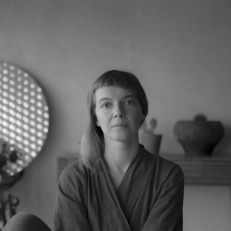
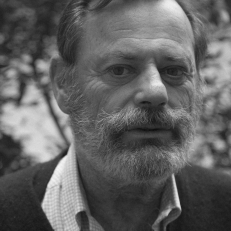
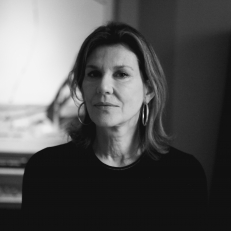
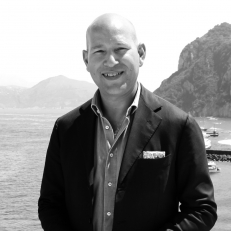
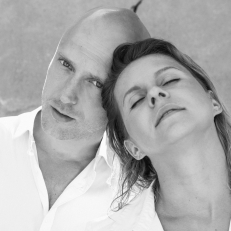
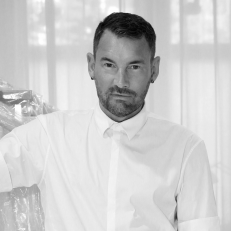
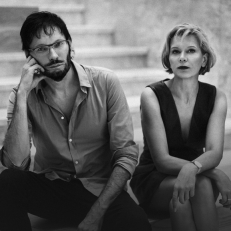
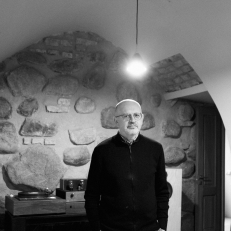
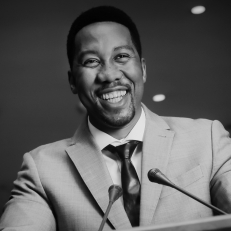
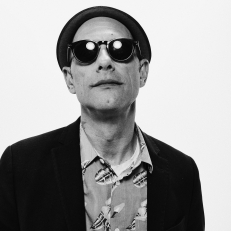


Add a comment